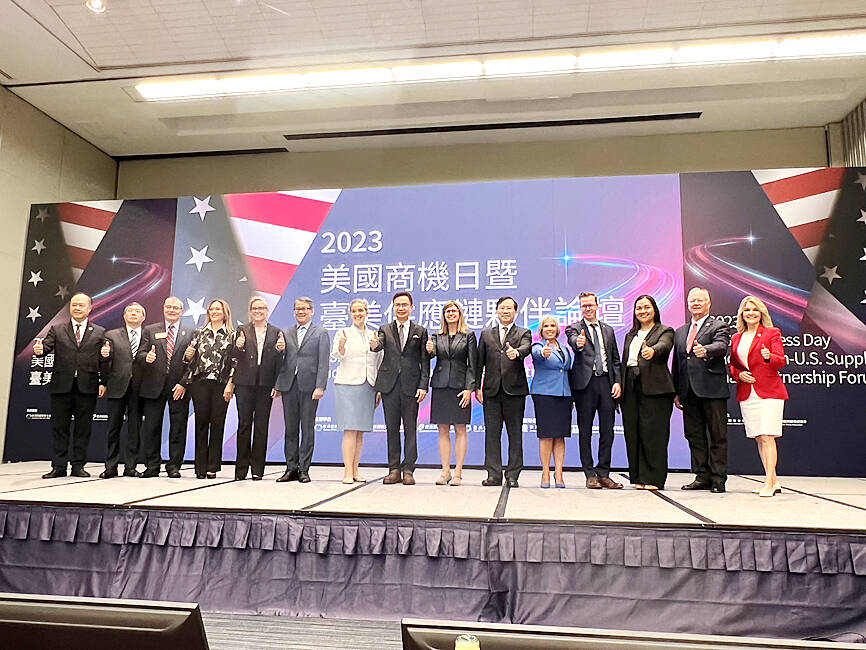The Ministry of Economic Affairs, the Taiwan External Trade Development Council (TAITRA), the American Institute in Taiwan (AIT) and the American State Offices Association yesterday jointly held the US Business Day investment forum at the Taipei International Convention Center as both sides gear up for more business opportunities together.
Deputy Minister of Economic Affairs Lin Chuan-neng (林全能) said in opening remarks that the Taiwan Strait issue has been a focus of global security, but foreign businesses still have confidence in Taiwan’s market, as companies such as Applied Materials Inc, ASML Holding NV and Merck Group continue to invest here.
“Taiwan is indeed a trustworthy partner in the global supply chain,” Lin was quoted as saying in a statement released by TAITRA.

Photo: Lin Jin-hua, Taipei Times
Taiwan and the US continue to strengthen economic and trade cooperation based on shared values, TAITRA chairman James Huang (黃志芳) said in the statement.
For example, US President Joe Biden last month signed into law a bill that approves the first agreement negotiated under the US-Taiwan Initiative on 21st-Century Trade, which is proof of the trust and cooperation between Taiwan and the US over the past decades, Huang said.
AIT Director Sandra Oudkirk was quoted as saying at the forum that bilateral investment between Taiwan and the US in the semiconductor, electric vehicle and 5G industries would help increase employment and economic growth on both sides, and boost cultural exchanges and business opportunities.
Many US states have established offices in Taiwan over the past three years, amid a closer relationship between Taiwan and the US, Oudkirk said, adding that 18 US companies, including Super Micro Computer Inc, attended the investment forum.
Last year, Taiwan was the US’ ninth-largest trading partner, while the US was Taiwan’s second-largest, as well as one of its most important sources of foreign direct investment and technological input, the TAITRA statement said.
This year, more than 200 Taiwanese businesses, including Lite-On Technolgy Corp (光寶科技), Compal Electronics Inc (仁寶電腦), Aerospace Industrial Development Corp (漢翔航空), Teco Electric and Machinery Co (東元電機) and Sinbon Electronics Co (信邦電子), attended the event to engage in one-on-one business meetings with US companies, it said.
Arizona Governor Katie Hobbs, who led a delegation to Taiwan for the forum, said in a speech at the event that her state is expecting more opportunities to cooperate with Taiwanese businesses following a spate of investment by firms in the Taiwanese semiconductor supply chain.
New Mexico Governor Michelle Lujan Grisham, who was also heading a delegation, spoke of the economic diversity of her state, with industrial investments focusing on green energy related to the hydrogen, aerospace, smart manufacturing, electric vehicle, information security and tourism sectors.

Macronix International Co (旺宏), the world’s biggest NOR flash memory supplier, yesterday said it would spend NT$22 billion (US$699.1 million) on capacity expansion this year to increase its production of mid-to-low-density memory chips as the world’s major memorychip suppliers are phasing out the market. The company said its planned capital expenditures are about 11 times higher than the NT$1.8 billion it spent on new facilities and equipment last year. A majority of this year’s outlay would be allocated to step up capacity of multi-level cell (MLC) NAND flash memory chips, which are used in embedded multimedia cards (eMMC), a managed

CULPRITS: Factors that affected the slip included falling global crude oil prices, wait-and-see consumer attitudes due to US tariffs and a different Lunar New Year holiday schedule Taiwan’s retail sales ended a nine-year growth streak last year, slipping 0.2 percent from a year earlier as uncertainty over US tariff policies affected demand for durable goods, data released on Friday by the Ministry of Economic Affairs showed. Last year’s retail sales totaled NT$4.84 trillion (US$153.27 billion), down about NT$9.5 billion, or 0.2 percent, from 2024. Despite the decline, the figure was still the second-highest annual sales total on record. Ministry statistics department deputy head Chen Yu-fang (陳玉芳) said sales of cars, motorcycles and related products, which accounted for 17.4 percent of total retail rales last year, fell NT$68.1 billion, or

In the wake of strong global demand for AI applications, Taiwan’s export-oriented economy accelerated with the composite index of economic indicators flashing the first “red” light in December for one year, indicating the economy is in booming mode, the National Development Council (NDC) said yesterday. Moreover, the index of leading indicators, which gauges the potential state of the economy over the next six months, also moved higher in December amid growing optimism over the outlook, the NDC said. In December, the index of economic indicators rose one point from a month earlier to 38, at the lower end of the “red” light.

MediaTek Inc (聯發科) shares yesterday notched their best two-day rally on record, as investors flock to the Taiwanese chip designer on excitement over its tie-up with Google. The Taipei-listed stock jumped 8.59 percent, capping a two-session surge of 19 percent and closing at a fresh all-time high of NT$1,770. That extended a two-month rally on growing awareness of MediaTek’s work on Google’s tensor processing units (TPUs), which are chips used in artificial intelligence (AI) applications. It also highlights how fund managers faced with single-stock limits on their holding of market titan Taiwan Semiconductor Manufacturing Co (TSMC, 台積電) are diversifying into other AI-related firms.